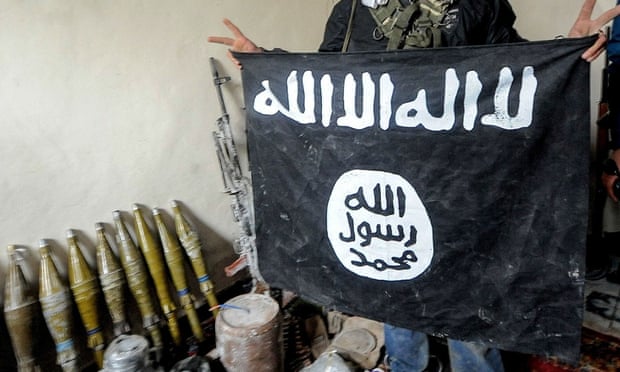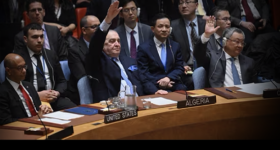Shawn Helton
21st Century Wire
As the stage is being set for another major conflict in the Middle East, there are some legal issues to consider in lieu of the Congressional gridlock that will inevitably ensue over Obama’s new war proposal.
The apparent proposal said to be for “fighting ISIS” is already being used to polarize public opinion – while loosening the definitions of war once again…

IMAGE: ‘War Redefined’ – Obama seen here setting the stage for the next administration. The portrait of Theodore Roosevelt as a ‘Rough Rider’ in the background invokes feelings of ‘manifest destiny’ in the wake of Washington’s current war pursuit of dominance over both Iraq and Syria. (Photo link cmgdigital.com)
War Resolution & Military Force
Each US president stands on the shoulders of the previous administrations, and will always utilize power granted by the actions of those before. No where is this concept better illustrated than with the continuing expansion of war powers. Like many chief executives before him, President Barack Obama is currently standing at that historical threshold again. Is he going to do as other have before him – and further loosen and distort the concept and legal language of war?
The War Powers Resolution of 1973 has been a source of sharp debate with US leadership since it was passed, and the ‘constitutionality’ of the joint Congressional law has been questioned by every US President since its establishment.
The main impetus of the ‘1973 WPR’ was to check the authority of a president when declaring war, as the provision stipulates that Congress must give the official declaration for any armed forces combat mission undertaken on behalf of the United States. The resolution was meant to strengthen Congress’s ability to participate in the event of a declared war, granting that a US President can only place troops into a hostile situation or situations, “where imminent involvement in hostilities is clearly indicated by the circumstances.”
The 1973 WPR was passed as a reaction to the lack of Congressional oversight in the wake of presidents John Kennedy, Lyndon Johnson and Richard Nixon, who had kept US armed forces in Southeast Asia for over a decade. The resolution required that president communicate to Congress within 48 hours the placement of US armed forces around the globe. Congress would also have to grant an extension of war after 60 days. The joint resolution passed despite Nixon’s Presidential veto at the time.
Presidents have, over and over, used armed combat without a formal declaration from Congress. Bill Clinton did it with bombing campaigns in Iraq, Serbia, Kosovo, in addition to sending thousands of troops to Haiti, and Barack Obama did it with a NATO-backed intervention in Libya. Most notably, George W. Bush did it with both the Iraq and Afghanistan campaigns, while Ronald Reagan invaded Grenada, and George H.W. Bush invaded Panama and bombed Iraq during the first Gulf War.
In fact, there have only been five official declarations of war for both World War I and II, the Spanish-American War, the Mexican-American War and the War of 1812. Scholars have suggested that US presidents have used military force outsidse the US between 100-200 times without any formal declaration.
The constitutionality of the two most significant 21st century modern war authorizations have been debated over the past 14 years since 9/11. Both the 2001 and 2002 Authorization for Use of Military Force (AUMF) have been cited during the 2003 Invasion of Iraq and used for justification in the 13 year campaign in Afghanistan. While US reports could attach language from the 2001 AUMF to Afghanistan by citing that “al -Qaeda networks” were said to be in the area, this would be a deliberate distortion as it ignores how the Mujahedeen fighters became al-Qaeda in the first place, as we have long since known foreign policy makers in Washington organized the arming and training of rebel forces in Afghanistan in the late 1970’s.
Many now believe that the 2002 AUMF which was passed by the 107th Congress, was based on highly misleading and doctored intelligence reports, enabling a completely unjustified invasion of Iraq in 2003. Deceptive intelligence fraudulently claimed that Iraq had been harboring Weapons of Mass Destruction (WMD), as the CIA and others were caught fabricating the story. The pretext on which the 2002 AUMF, prompted many to question its validity, since its specific language to allow military force was proven to be false.
The political fall-out was massive. In February of 2003, US diplomat John Brady Kiesling, resigned due to the “distortion of intelligence” and “systematic manipulation of American opinion.” This prompted a wave of criticism over the invasion and the so-called intelligence reports used to justify the AUMF and the invasion of Iraq in 2003. Here is an excerpt from the 2002 AUMF that clearly discussed pursuing ‘nations’ and ‘organizations’ linked to the “planning of the 9/11 attacks”:
“Congress has taken steps to pursue vigorously the war on terrorism through the provision of authorities and funding requested by the President to take the necessary actions against international terrorists and terrorist organizations, including those nations, organizations, or persons who planned, authorized, committed, or aided the terrorist attacks that occurred on September 11, 2001, or harbored such persons or organizations.”
Nine days after the 9/11 attacks, the now defunct think-tank, Project for the New American Century (PNAC) wrote an open letter to then President George W. Bush. The contents of the letter contained the deception used to assemble the all-important ‘coalition’ behind the fraudulent invasion in Iraq:
“Even if evidence does not link Iraq directly to the attack, any strategy aiming at the eradication of terrorism and its sponsors must include a determined effort to remove Saddam Hussein from power in Iraq.”

IMAGE: Use of Force – John Yoo former Department of Justice legal counsel (Photo link mediabugs.org)
Obama’s New War Powers Reform
While the AUMF was not an official “declaration of war”, it does provide the legislative grease needed to allow more authority to be used by a US president.
The AUMF authorization and other constitutionally questionable and controversial provisions such as the Patriot Acts, were carefully crafted by individuals like John Yoo, who was the deputy assistant attorney general in the Justice Department’s Office of Legal Counsel during the time. Yoo was hired to make the illegal look legal, and was also key in redefining the legal language of conflict, combat and internment. As an architect of the AUMF, the Patriot Act and the Bush administration’s legal memos justifying torture and the NSA’s warrantless wiretapping, Yoo’s legal legacy exposes a deeper design used to push the war on terror for geopolitical gain.
Every power which Yoo had screwed into place has been subsequently utilized by Barack Obama. His new anti-ISIS proposal is already positioned to be yet another revision of the AUMF, and will most likely afford Obama – or any future president – an even greater expansion of executive authority. It’s also worth noting that all of these war powers have been gained on the back of highly dubious and forensically unproven terror incidents.
The erosion of sovereign rights has been directly linked to an increased security state, opening the door for things such as targeted drone killing and the National Defense Authorization Act (NDAA), which was expanded under the Obama administration, including a portion of the provision authorizing the use of “indefinite detention” without due process.
A Critique of War
“President Obama stated on network television that he may have authority to order airstrikes in Syria. He does not. Moreover, bombing he ordered in recent days in Iraq by U.S. aircraft violated the Constitution and the War Powers Resolution of 1973.”
In a Sputnik news release from this past October, Findley continued to object to the abuse of power in government:
“Our elected leaders are acting like jellyfish. Congress must decide whether to bomb Iraq or Syria, or both. The president has no authority to bomb either. He violates the constitution with every bomb he drops on Iraq. Ordering acts of war is too serious a decision to leave to one man.”

IMAGE: ‘Meeting with Terror’ – US Senator John McCain in a SETF meeting with Syrian militants and terrorists in 2013. ( Photo link socioecohistory.wordpress.com)
A Summary of Conflict
The Senate Armed Services Committee, now led by Senator John McCain, is in favor of removing ALL restrictions with a new AUMF resolution which is said to be for “fighting ISIS”, with neoconservatives pushing for the ability to wage expanded ground warfare. 21WIRE has reported previously on how McCain has been consistently pushing for deeper involvement in Syria as part of a larger geopolitical agenda, and even met with ISIS linked militants in 2013. We now know from our research that the FSA and other fighting groups are inextricably tied to origins of ISIS and they now have a non-aggression pact with each other, having connections to other so-called ‘moderate’ rebels.
In a recent report by Slate, the political quagmire over ISIS and the perceived ‘unconstitutional’ force used by the US president is clearly outlined:
“The White House’s defenders argue that the 2001 AUMF gives Obama the authority he needs to fight ISIS because, while ISIS broke from al-Qaida in 2012, it is nonetheless composed of former al-Qaida members (at least in part), who have (or so it is argued by the administration) continuously conducted and sought to conduct attacks against the United States and its citizens and interests.”
“But this legalistic wrangling is beside the point. Back in 2011, President Obama used military force against Libya. Unable to rely on the 2001 AUMF or the 2003 AUMF against a government that had nothing to do with al-Qaida or Iraq, Obama relied on his constitutional authority. The administration claimed that the War Powers Resolution did not apply because sending planes to drop bombs and fire missiles at enemy troops did not amount to “hostilities” governed by the war powers act. This was a ludicrous interpretation of the law.”
In December of 2014, The Senate Foreign Relations Committee voted 10-8 in favor of Senator Robert Menendez’s new ‘ISIS-related AUMF’, which doesn’t want to rely on the previous AUMF’s, thus breaking free all of their previous controversy and legal restraints.
Here is an excerpt from the new proposal which also includes a repeal of the 2002 AUMF:
“The provisions of this joint resolution pertaining to the authorization of use of force against the Islamic State of Iraq and the Levant shall supersede any preceding authorization for the use of military force.”
If US lawmakers are interested in crafting a new AUMF, how will they justify its constitutionality in relation to the War Powers Resolution by phasing out the older AUMF’s? If history is any guide, Obama is merely ‘teeing up’ for the next US Administration which will mostly likely be a more neoconservative one.
Or is this could be just another step in the evolution of a state which measures its health and well-being through war?
More from the Guardian below…
IMAGE: ‘Distortions of war’ – an apparent Kurdish fighter holds up an Isis flag in the Syrian border town of Kobani. (Photo link guardian.com)
Isis war to extend far beyond Iraq and Syria under Obama’s proposed plan
Spencer Ackerman and Dan Roberts
The Guardian
Barack Obama’s proposed framework for the US-led war against the Islamic State will not restrict the battlefield to Iraq and Syria, multiple congressional sources said on Tuesday, placing the US into a second simultaneous global war that will outlast his presidency.
Several congressional sources familiar with the outlines of the proposal, all of whom expected the White House to formally unveil it on Wednesday, told the Guardian the so-called Authorization to Use Military Force (AUMF) would bless the anti-Isis war for three years.
Congressional language to retroactively justify the six-month-old US war against Isis will not, they said, scrap the broad 9/11-era authorities against al-Qaida, as some congressional Democrats had proposed, meaning the two war authorizations will coexist.
Asked if the anti-Isis AUMF opens the US to a second worldwide war against a nebulous adversary, one congressional aide answered: “Absolutely.”
Two legislative aides with knowledge of the outlines of the White House proposal said the new AUMF would clarify that the 2001 authority, which Obama has cited to justify everything from drone strikes in Yemen to detaining Taliban combatants beyond the end of US combat in Afghanistan, will no longer apply to the war against Isis.
Those military contours would abandon Obama’s current contention that his legal authorities to confront Isis in the absence of explicit congressional approval stem partially from the 2001 AUMF, a contention that has papered over the furious division between Isis and al-Qaida. The 2002 authorization for invading Iraq and deposing Saddam Hussein, his other claimed residual legislative authority, would explicitly expire.
But the retention of the 2001 AUMF would back away Obama almost entirely from his May 2013 call to repeal the legal wellspring of an open-ended global war. Though Obama has boasted this year of drastically reducing the number of US forces in ground combat, the addition of another broad war authority ensures that he, like George W Bush, will also hand over two wars to his successor.
Authorization for the second global war “contrasts with the restraint that Obama likes to emphasize”, said Micah Zenko of the Council on Foreign Relations.
“Politicians often describe their war aims with restraint, but the people who have to operationally conduct war like no restraints,” Zenko said. “Obama has given everyone who will service in his administration the ability to prosecute this war in as expansive a manner as they choose.”
White House officials did not immediately respond to questions from the Guardian.
The congressional sources said that the anti-Isis AUMF – many of the terms of which were first reported on Tuesday by Bloomberg – will contain restrictions on US ground conflict in Iraq, though exceptions will remain. One congressional source told the Guardian that leaders on Capitol Hill had likened the exceptions to permitting special operations forces to rescue downed pilots, or to allowing the current 3,000 troops Obama has authorized deployed to Iraq to spot for air strikes.
Similar to language grandfathered into the 2001 AUMF through Obama-era defense bills that permitted the targeting of al-Qaida’s “associated forces”, the sources familiar with the current negotiations said Obama and his successor would have the power to target Isis’s associated forces as well.
None of the congressional sources said they knew yet whether the White House text would define those associated forces. But one source said the text was heavily influenced by a draft proposed by Senator Robert Menendez that passed the Senate foreign relations committee in December.
Menendez’s bill defined an associated force as “individuals and organizations fighting for or on behalf of the Islamic State of Iraq and the Levant or a closely-related successor entity”.
Read more at The Guardian
















